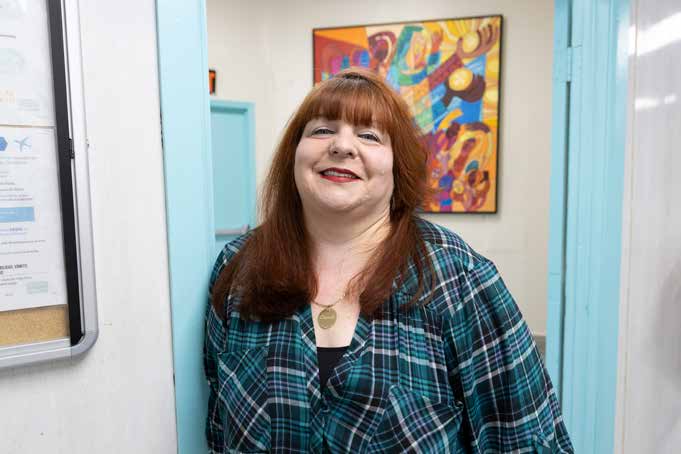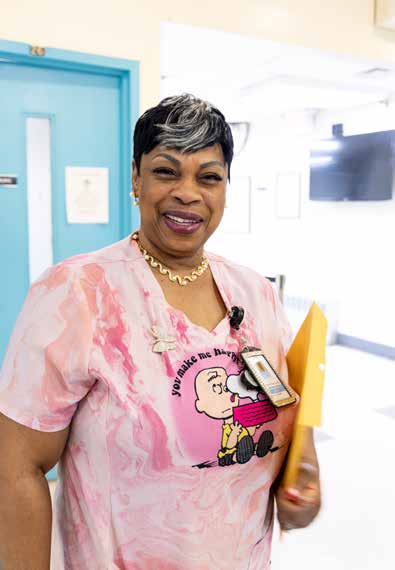The Work We Do: StartCare Methadone Clinic
February 24, 2025
Members who work at the StartCare methadone clinic in Bushwick, Brooklyn, are dedicated to providing compassionate and empathetic care to people who are trying to turn their lives around after becoming addicted to opioids. The risk of death from overdose has increased substantially because of the prevalence of the synthetic opioid, fentanyl; so the work of 1199ers at StartCare is literally lifesaving. Overdose deaths have reached epidemic proportions in NYC. In 2023 there were 3,046 New Yorkers who died from overdose compared with 391 people who lost their lives to homicide and 265 who were killed in traffic accidents.
Fentanyl began flooding into the street drug market roughly 15 years ago because it is 50 times more potent than heroin, yet much cheaper to produce, so it yields much greater profits for drug cartels. In 2023, fentanyl was present in 80 percent of all NYC overdose deaths. The over-prescription of opioids such as OxyContin and Percocet beginning in the 1990s also played a part. OxyContin is highly addictive and some patients who were no longer able to obtain prescriptions turned to street heroin instead. Users are often unaware that the drugs they are purchasing contain fentanyl.
StartCare is a community-focused, Black-founded and BIPOC-operated organization that has been leading the way in delivering care for New Yorkers seeking health support since 1969. Union members provide comprehensive, culturally responsive, and compassionate care for individuals, families, and communities. With a specialized focus on addiction recovery, mental health care, and biomedical research, StartCare operates six community-based locations across New York and provides care for 3,000 to 4,000 participants each year. Members recently ratified their third Union contract, including 11 percent across the board wage increases over three years. For Counselors, the average increase was 17 percent. The agreement also included longevity bonuses and added a $2,000 raise for all staff who spoke Spanish.

“I told him it’s normal to get cravings and we did some breathing exercises together. It is important to keep talking to shake your feelings. If you want to cry, cry,” says Cedeño, “Addiction burns bridges and people sometimes feel they have no one to talk to. This man was in foster care and abused by his caregivers and also has a lot of trauma from being incarcerated.
“It is very sad what people have been exposed to. Their parents may have been addicts, so they never learned coping skills. We teach them how to manage their feelings. Many suffer from depression, bipolar disorder and anxiety. Sometimes we refer them to a psychiatrist at another one of our locations.”
Cedeño used to work at Narco Freedom in Red Hook, Brooklyn for 11 years. She has a bachelor’s degree and a CASAC qualification and would like to use the Union’s Training and Upgrading Fund to train as a social worker and become a supervisor at StartCare. “I like working here. I can walk to work.”
Cedeño understands the importance of fighting to protect Medicaid for both 1199ers and her clients. Ahead of the November election, she canvassed for Laura Gillen on Long Island and helped her flip the 4th U.S. Congressional District blue.
“There are 250 patients who walk through our doors every day, so there is never a dull moment. So much of the street heroin is laced with fentanyl. We are in the business of saving lives,” says Cedeño.

“The caseloads at StartCare are higher, but I can manage that because of my experience. I’m not a person who likes to sit still and I’ve never liked looking at the clock,” she said.
“I feel like everything that people do in life is because of trauma. These are just people who don’t have coping skills. Some are homeless and hungry, others are moody and aggressive. But I know how to diffuse the situation. It is about letting them know that they are important, so they feel heard,” says Krizni. “It is important that you don’t make them feel like a nobody.
“When I was younger, I would go home and talk to other counselors about the day. I used to take things personally and blame myself. At my age now, I’m done with worrying about the little things.
“When I started 25 years ago, I was not nearly as concerned about people dying as I am now. These clinics keep people alive. If they didn’t exist, even more people would die of heroin overdoses.”

“CMTs are the first face you encounter when you come to Start,” says Uzoma. “I have to tell people when their physical is overdue and when they need to do a urine toxicology test. People can be very aggressive, but you have to act professionally and help them to calm down. Sometimes I make coffee for them to help them feel more relaxed and put them at their ease.”
After getting his CMT qualification, Uzoma joined the U.S. Navy and attended their training facility in Chicago. But he missed New York and worked here as a contact tracer during COVID. He also worked for the Metropolitan Transit Authority (MTA) recording subway and bus employees’ sick time during the pandemic.
“I like it here at Start because now am talking to people face-toface and building relationships with them. I work as a floater in different clinics and it’s my job to take their vitals before they see the provider.
“I see more doors opening in the fields of EKG and phlebotomy and I want to take advantage of the Union’s educational benefits to increase my skills.”

Her day starts at around 6am when they set up the dispensary so that they can open the doors at 6.45am on the dot. “People are already lined up and take their place one the line very seriously,” says Jones who alternates between dispensing methadone and providing primary care on a weekly basis.
“Patients tell us great stories. It is good to have the chance to interact with them. We had a patient welcome their first grandchild recently. We always want to see them do great,” says Jones.
Jones hopes to grow her career in the healthcare field at StartCare. She would like to go back to school to become an RN, with the help of the Union education benefits.
“A lot of our patients feel overlooked,” says Jones, “They appreciate how we treat them here, without stigma, like anyone else. We give them a level of respect that they don’t always get in the outside world.”

“Sometimes people will be gone for a few years and then come back. We tell them it is nothing to feel bad about. We all fall down.
The point is to get back up again. The fact that you came back to get some help says something about you. A lot of people who come here are in and out of jail. We call them Mr. and Ms. and it boosts their morale. They are not a number. They are human.”
Daley-Lewis doesn’t do this work for the money, “If I was here for the paycheck I would be long gone. I love my patients. They share stuff with me that they won’t share with anybody else. We’ve built up trust over the years.
Working on the medical side, it is part of Daley-Lewis’s job to take swabs from patients to make sure they are not taking heroin. They need to be clean to have their 90-day methadone prescriptions renewed.
“It is never a dull moment. Sometimes we get cussed out. Sometimes they come back and apologize. The staff here are like family, and we lean on each other,” says Daley-Lewis.
“Our clients have been through a lot. They may have been abused sexually or physically. That is all they know. People make a lot of assumptions about them. These people are not just addicts. They are people. Some have to relocate to another clinic to get away from a family member who is abusing them.
As a member of the 1199SEIU bargaining committee, Daley-Lewis, recently helped negotiate the third contract with StartCare, which was ratified last month. Members first organized with 1199 in 2018.
She has seen many changes over the past two decades. “We’re seeing a lot more people at risk of overdose nowadays.” Sometimes staff have to run outside and administer naxolone or call EMS for someone who is waiting on line for methadone.
“We’re here for the underdogs, says Daley-Lewis. “A lot of times their family doesn’t want to be bothered by them.”

